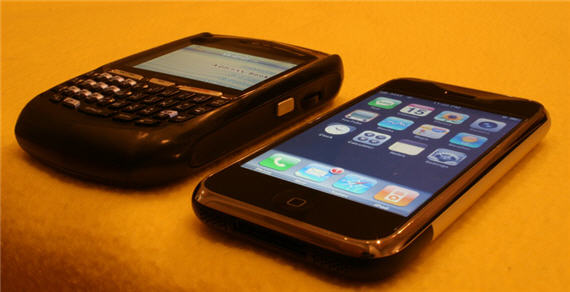Etiquette In An Always-On World
Should we just accept that people are going to be on their iPhones and BlackBerries and redefine rudeness?
Peggy Nelson‘s provocative piece on smartphone etiquette, “How I Learned to Stop Worrying and Love the Flow,” is getting some minor buzz.
It fits in your pocket, why shouldn’t you carry it? It’s always on, why shouldn’t you answer it? Why shouldn’t you text someone the minute you think of something, or check to see what they’re doing? Why shouldn’t you be available, to everyone, all the time?
Availability at a distance often means rudeness in person. Showing up means you’re already over. Presence pales before possibility.
[…]
Our proximate legacy is the etiquette of the Enlightenment, in which the individual is the ultimate, indivisible unit of civilization, and is treated as such. For example, being with somebody means focusing attention on that person. You respect the discrete nature of the individual by being discreet about the rest. Do you need to make a call or check a message right that minute? No, actually, you don’t; you wait until you have retired, to your office, to your private space, and conduct the rest of your affairs from there.
[…]
We’ve moved from the etiquette of the individual to the etiquette of the flow.
This is not mob rule, nor is it the fearsome hive mind, the sound of six billion vuvuzelas buzzing. This is not individuals giving up their autonomy or their rational agency. This is individuals choosing to be in touch with each other constantly, exchanging stories and striving for greater connection. The network does not replace the individual, but augments it. We have become individuals-plus-networks, and our ideas immediately have somewhere to go. As a result we’re always having all of our conversations now, flexible geometries of nodes and strands, with links and laughing and gossip and facts flying back and forth. But the real message is movement.
Certain times and locations have been crucibles for the rapid development and proliferation of ideas; for example, 18th century coffeehouses, or the 19th century’s café society. But now we assemble virtually, via the mobile technologies of the conversations themselves. The new coffeehouse is not a place per se, it’s a feature.
[…]
We’re beginning to inhabit ad hoc, overlapping, always-on virtual salons — you’re talking to someone, and then you both get pulled off into different directions, to form different shapes and vectors within the conversations, and then come together again, having never really been apart. You can even have multiple conversations via multiple media with the same person in the same span of time. Single conversations are one-dimensional chess; our language games have increased in complexity. And, potentially, in reward. Because with its ability to feel distant stories in a more personal manner, the expanded self points a way towards those stories becoming more relevant, and perhaps more actionable.
While I have been carrying a smartphone for several years (until yesterday, a BlackBerry, now an iPhone) I still haven’t adjusted to this new reality. Nor, I gather from the commentary on this piece I’ve seen, have most people over the age of 30.
But the change is doubtless coming.
For twenty-somethings, I think this is already a non-issue within their peer groups. Everybody’s on their iPhones and Droids all the time, Facebooking, Tweeting, and texting the minutia of their existence. Unless they’re around old farts like me, nobody’s the least bit upset by this.
As recently as twenty years ago, nobody expected to be able to get in touch with you after hours. If you answered your home phone*, great. If an answering machine** picked up, it was almost creepy. Soon, though, people became annoyed when you didn’t have an answering machine.
We’ve only been in the mass cell phone era for maybe fifteen years and in the smart phone era much less time than that. But we’re already at the point where people expect to get in touch with you almost immediately during waking hours. And we’re only going to get more connected as time goes on.
This means that we’re in a transitional period. If you’re, say, 35 you’ll annoy the people around you if you answer your cell or emails while you’re at a small social gathering. The smaller the gathering, the more annoying the act. But, at the same time, you’re going to annoy the people leaving you voice mails, text messages, and emails if you don’t respond in a reasonable period.
So, which is ruder?
__________
*In those days, most of us had one or two land line telephones at home. Only the very wealthy and early adopters had car phones, which were very large.
**A predecessor to voice mail.







“But, at the same time, you’re going to annoy the people leaving you voice mails, text messages, and emails if you don’t respond in a reasonable period.”
And what is a reasonable period? It doesn’t necessarily mean an instant reply in any circumstances or we’ll have phones going off in the middle of Cavelleria Rusticana.
Whatever the period, it seems to be accelerating.
The expectation on a text or voicemail is faster than an email, I think. That’s especially true during the business day.
Bad news for those who like a little space in their lives. I don’t envy today’s 30 year olds. Forever available to speak to Connie!
I resolve to adjust to the new reality, no longer will I stop some dickhead when he steps off the curb into traffic because he is texting on his phone, I will no longer be polite in asking some loud mouth to stfu when his conversation can be heard all down the train car I am in, I will no longer hold my comments to myself when some woman is on the phone bitching about this female ailment or that one, and lastly I will no longer wait patiently at traffic lights when some jackass is to busy texting to realize the light has changed.
When individuals think they can set the norms of society then we are in for anarchy and the self important wired in fools will soon find out that people will enforce the norm on them one way or the other. Cell service blockers will become more prevalent, legal or otherwise as some people look for haven from fools with phones. mpw
I chalk up the notion of enhanced rudeness through technology mostly to the problem of “the ideal past”. The ideal past is the phenomenon where most people tend to see the past more positively than what it actually was.
Part of this is due to the fact that as people get older, they tend to have more time to analyze the world with a broader perspective and come to more realistic understandings. Of course, they don’t see that it was them who changed (their perception of reality), but that it was the world around them that got worse (when in actuality, the world was relatively constant, and they changed profoundly).
The other part is that neurologists find that there is a correlation between remembering the past more favorably and longevity. Is it a defense mechanism to stave off stress, improve health and the like by deluding ourselves?
When there weren’t cell phones, how candidly could you communicate with a real-life person without social intimidation? How attentive were they to you? I talk to people in person all the time, 90% are over 40 yoa. Most of the time they talk over me when they are bored and don’t listen at all. Nothing is resolved and I end up feeling worse than when I started. If I send that same person an email, they likewise don’t answer the email and nothing is resolved.
Some people learn to take the time to be good communicators, clear speakers, and active listeners, no matter what the mode of communication is, and some people simply don’t. Social mores and norms will change as has been evident with cell phones, etc in the information age. People’s reluctance to accept them usually has more to do with themselves than society.
If you’re only with one other person, it’s much more rude to answer the phone and text than to not respond (unless it’s an emergency call from a family member). If there are two or more people with you, go ahead as long as it doesn’t too heavily disrupt whatever activity you are doing with the other people in person.
Manners morph over time. Relax. Let it happen.
If we’re talking about social as opposed to business interactions, I don’t mind people answering their cell or text when they’re with me, so long as they don’t mind if I get up and move on to other things myself. I do get annoyed by those who expect me to waste my time waiting for them to finish their call or texting …
Yes, time to get over it.
It is really rude to hold other people up while you text or talk unless it’s really urgent. Give the waitress your order. Pay your bill and move out of the way in check out. Those kinds of things.
Otherwise it’s a connected world.
I will say that any time I need to interact with others I keep my contacts brief…. I was never one to yak on the phone though.
Yes, time to get over it.
It is really rude to hold other people up while you text or talk unless it’s really urgent. Give the waitress your order. Pay your bill and move out of the way in check out. Those kinds of things. Turn your phone off or to vibrate when in meetings/movies/etc….
Otherwise it’s a connected world. You control how connected you want to be and those that interact with you will figure it out. You don’t control how connected they are.
I will say that any time I need to interact with others I keep my contacts brief…. I was never one to yak on the phone though.